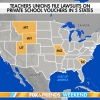Dear Patriots,
We are still having a rush of relief and gratitude for the Supreme Court decisions that were announced late last week. There will be discussion on all of these decisions for many years to come.
We offer several pieces looking at the decisions and urge you to know more about them. This is important as the left is once again hysterical and shouting their lies at the tops of their voices.

1- The celebration of freedom and independence took on a special meaning to many this weekend.
Gerald Baker at The Wall Street Journal
The Supreme Court Declares Independence
QUOTE: The rulings on affirmative action, student loans and free speech herald a counterrevolution against the left’s domination of American institutions.
Fourth of July celebrations arrive with special resonance for conservatives this year. It is clear now that we are in the throes of a full-scale American cultural counterrevolution, propelled by rising popular opposition to the coercive orthodoxies of a hegemonic left and enforced by a string of impeccable decisions from a Supreme Court intent on reviving the spirit of 1776. Spectacular displays of pyrotechnics from an endangered establishment, increasingly hysterical at the dawning realization of its imminent overthrow, are as entertaining—and ultimately harmless—as any you will witness in the night skies this holiday.
The popular rebellion against the cultural left that has seized so many of the institutions of American life has enjoyed mixed success at the political level. But since that hegemony was established in large part through half a century of grotesque judicial overreach, it was likely to be truly overturned only by a judiciary that would finally move to substitute restraint for activism.
With last week’s timely, pre-Independence Day succession of decisions by the court we can see better than ever that the counterrevolution is advancing apace. In Biden v. Nebraska, Students for Fair Admissions v. Harvard, and 303 Creative v. Elenis, a solid majority struck solid blows for the principles and values that helped create the U.S. in the first place.
In the three cases—respectively over the Biden administration’s student debt cancellation plan, racial preferences in college applications, and free-speech protections in commercial interactions—the judgments rescinded the usurpation by an expansive executive of the power of the purse, restored the principle of merit over group membership as a key determinant of individual opportunity, and reaffirmed a citizen’s right not to be compelled to endorse ideas with which she disagrees.
The counterrevolution has been achieved through painstaking efforts by conservatives to recruit, develop and advance jurists of reliably originalist disposition, as well as through presidential nomination—by Donald Trump, especially—of well-qualified justices who wouldn’t, for a change, acquiesce to the left’s dominance.
The left’s response to the reversal of its long success in making the court a second legislative branch of government is also telling. Instead of accepting, as limited-government, originalist conservatives did, the need for a long campaign to undo the hegemony of the rival philosophy, they want to short-circuit the process. This means protecting or restoring their authority by making radical institutional changes to the court or, failing that, by delegitimizing it, using a friendly media to impeach the reputation of justices they oppose with spurious allegations of impropriety.
Like almost all rebellions, the current American cultural counterrevolution is certain to face further and intensified resistance from the institutions and people whose dominance it threatens.

2- Homosexual and transexual activists do not have the right to force you to do work for them. You have freedom of association. As with SO much these days, it never should have been necessary to clarify this, but thank God sanity prevailed. Read more about these eight points at the link. We offer three of them here.
8 Fire Quotes From Gorsuch In Landmark Free Speech Case
QUOTE: Justice Neil Gorsuch offered a straight-fire defense of free speech and religious liberty in the U.S. Supreme Court’s 303 Creative v. Elenis decision on Friday, which represented a major win for Americans’ First Amendment rights.
As The Federalist’s Jordan Boyd reported, the high court ruled that the government cannot force Colorado graphic artist Lorie Smith to “make wedding websites celebrating same-sex couples because it would violate her constitutional right to exercise her Christian belief that marriage is between a man and a woman.” The high court further noted that such state-enforced coercion is a violation of Smith’s First Amendment rights.
Writing for the majority, Gorsuch left little doubt the current court has a vested interest in defending Americans’ rights to free speech and religious liberty.
Here’s a list detailing eight of his best lines from the opinion.
1. Gorsuch blasted Justice Sonia Sotomayor and the dissent for distorting the facts of the case.
It is difficult to read the dissent and conclude we are looking at the same case. Much of it focuses on the evolution of public accommodations laws … and the strides gay Americans have made towards securing equal justice under law … And, no doubt, there is much to applaud here. But none of this answers the question we face today: Can a State force someone who provides her own expressive services to abandon her conscience and speak its preferred message instead?
When the dissent finally gets around to that question—more than halfway into its opinion—it reimagines the facts of this case from top to bottom.
2. State-enforced speech is a blatant violation of the First Amendment.
If [Ms. Smith] wishes to speak, she must either speak as the State demands or face sanctions for expressing her own beliefs, sanctions that may include compulsory participation in ‘remedial . . . training,’ filing periodic compliance reports as officials deem necessary, and paying monetary fines. … Under our precedents, that ‘is enough,’ more than enough, to represent an impermissible abridgment of the First Amendment’s right to speak freely.
3. The dissent’s arguments in favor of coercing Smith’s speech are illogical.
In some places, the dissent gets so turned around about the facts that it opens fire on its own position. For instance: While stressing that a Colorado company cannot refuse ‘the full and equal enjoyment of [its] services’ based on a customer’s protected status … the dissent assures us that a company selling creative services ‘to the public’ does have a right ‘to decide what messages to include or not to include’ … But if that is true, what are we even debating?

3- In a rare event, Justice Thomas read his concurring opinion on affirmative action from the bench.
Justices Thomas And Jackson Help Us Understand Judicial Activism
QUOTE: The ink is barely dry on the Supreme Court’s decisions on religious freedom and affirmative action. That hasn’t hampered instapundits from offering their own decisions. “An extremist minority” has “displayed a willful ignorance of our reality.” I haven’t found polemics denouncing “activist courts,” but that’s probably because I can’t stomach searching for such unhinged screeds. But is every decision of the Court from activists? Are they legislating from the bench, to recall another favorite line from the party of the recently gored ox? Of course, it’s a bit rich to call the Supremes “extremists,” when even Justice Jackson joined a unanimous Court in upholding the free practice of religion.
Justice Thomas’ concurrence in Students for Fair Admissions is a classic study in legal analysis. He walks step by step through the colorblind nature of the Constitution. He notes that the Fourteenth Amendment “ensures racial equality with no textual reference to race whatsoever.” (Emphasis in the original.) He walks through the broad and long-standing legal identity between citizenship and equality. The arguments both for and against various wordings are fully exposed. Then he dissects the “antisubordination” view “that the Amendment forbids only laws that hurt, but not help, blacks.” This is radically opposite to the colorblind origins and intentions of the Reconstruction Amendments. This view is a policy preference but cannot be supported as law.
Justice Thomas then addresses the arguments of the universities and his leftist opponents on the Court. Remedies at law require compelling reasons to discriminate based on race. But despite many years of developing the argument that “diversity” has educational benefits, Harvard and UNC are still unable to show this. Instead, they present magical thinking. But even if the universities could show benefits, the law requires that they show that those benefits clearly outweigh the harms to others created by this discrimination. And this they cannot show. Finally, the individual students who benefitted from racist admission policies are not the victims of identifiable discrimination that can be legally remedied by being admitted. Thus, there is no lawful basis presented to discriminate based on race. In short, “courts have an independent duty to interpret and uphold the Constitution.” Indeed, this is the sine qua non of the law. “Purchased at the price of immeasurable human suffering, the Fourteenth Amendment recognizes that classifications based on race lead to ruinous consequences for individuals and the Nation.”
By way of contrast, Justice Jackson’s dissent focuses on “the historical subjugation of black Americans, invoking statistical racial gaps to argue in favor of defining and categorizing individuals by their race.” Somehow, we are trapped in a fundamentally racist society. She effectively denies Justice Roberts’ comment in 2006 that “The way to stop discrimination on the basis of race is to stop discriminating on the basis of race.” Her solution appears to be “to unquestioningly accede to the view of elite experts and reallocate society’s riches by racial means as necessary to ‘level the playing field,’ all as judged by racial metrics.”
Justice Jackson demonstrates most vividly the contrast between legal analysis and activist rhetoric. Jackson’s dissent is based not on law but on policy. And this runs right into the Scylla and Charybdis of the Constitution. On one side, the highest law in the land, the Constitution, stands directly athwart her aspirations. On the other, the Constitution forbids the Courts to enter the realm of policy. That remains exclusively the purview of Congress.
For the moment, Donald Trump shines brightly over America. He has given us a Supreme Court that actually settles cases in law.

4- We spent some of our time this long weekend reading a new book about Justice Clarence Thomas. In the book, ten cases in which Justice Thomas wrote opinions are reviewed in detail. The book is easy to understand. You do not need a law degree. It tells the stories of real Americans who have been hurt by government, institutions or special interests.
Justice Thomas is aways there for the “little guy”, protecting their rights under the guidance of the Constitution.
We highly recommend this book. You will read little in the rest of the world that will give you the truth of this great and wise man. American is blessed to have him on the Supreme Court.
The People’s Justice By Amul Thapar

Read. Know. Share. Pray.
Hold Fast,
Defending The Republic
To SHARE with a friend – SEND THEM THIS LINK
Questions – or for a Free Subscription to This Newsletter? Contact: editor@defendingtherepublic.org




